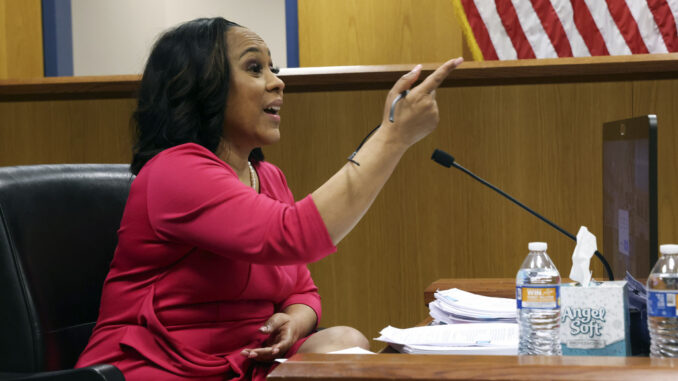
Earlier this month, Fulton County District Attorney Fani Willis, who is prosecuting former President Donald Trump in the Georgia election interference case, took the stand in a misconduct hearing where things got heated pretty quickly.
Willis is in the hot seat over impropriety allegations that stem from an admitted “personal relationship” she had with the special prosecutor she appointed, Nathan Wade.
Willis, Wade, and former friends testified about the relationship to defense attorneys for former Trump 2020 campaign official Michael Roman, who is also under indictment and who seeks to have Willis removed on grounds she improperly benefited financially from her relationship with Wade.
If the judge finds Willis engaged in wrong-doing, he could disqualify her, which in turn could cause significant delays in proceeding with the case.
Because Willis did herself no favors with her combative, hostile testimony — and because she’s a powerful Democrat who is prosecuting Trump, the media have swooped in to rescue her by trotting out the victim/race cards as a way to suggest she’s being unfairly targeted based on her physical characteristics.
For instance, the Associated Press headline stated that “Fani Willis’ testimony evokes long-standing frustrations for Black women leaders.”
In the New York Times, we learned “Why the case against Fani Willis feels familiar to Black women.”
“As Fani Willis shows, dominant, ambitious women leaders pay price,” declared the headline from an opinion piece published by the Atlanta Journal-Constitution.
The gist of what’s being written is that Willis, being a woman and Black, is being subjected to race-based “tropes” as well as a double standard that men in similarly powerful positions never would.
As I read these articles, I thought back to the Supreme Court confirmation hearings for Clarence Thomas and Brett Kavanaugh and how their lives were put under the microscope in extreme, brutal ways, and then I wondered “What alternative reality are Willis’ defenders living in?”
Her supporters are acting as though we are just supposed to look the other way regarding Willis’ alleged offenses simply because of her race and gender. But isn’t advocating that we do so a double standard and racist/sexist in and of itself?
The fact of the matter is that the allegations Willis faces are not unique to women, no matter their race.
As one Twitter user noted, “Dick Donovan of Paulding County was indicted and forced to resign for lying and using his authority as a prosecutor to benefit a woman with whom he [desired a] personal relationship.
That was two years ago. In Georgia. Dick Donovan is white.
There are many more examples of powerful men being on the receiving end of much worse than what Willis faced during her hearing, as noted above with the references to Thomas and Kavanaugh, just to name a few.
As I’ve said before, for true equality to happen in the working world, women — no matter their race, sexual orientation, etc. — are going to have to learn to take the professional lumps and criticisms just like men have, and should stop automatically assuming every slight is based on their race and/or gender.
Because doing the opposite, as people have done in the Willis case, is in effect claiming the exact type of special privilege that the left has been throwing in the faces of white males for decades as an example of the double standards.
Women simply can’t have it both ways when they are the ones who are under the microscope for questionable actions they’ve allegedly taken in the workplace.
Setting the standard for women that says it’s okay for them to engage in wrong-doing based on their gender and/or race is what actually sets them back, and it’s a tactic that should be categorically rejected in the interests of true equality.
North Carolina native Stacey Matthews has also written under the pseudonym Sister Toldjah and is a media analyst and regular contributor to RedState and Legal Insurrection.



